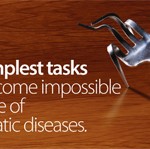Early on, the ACR surveyed lawmakers and referring physicians, explains Erin Latimer, director of public relations at the ACR.
“We tested everything from our messages to our visual creative,” she says, adding that the campaign’s other images involve a bent toothbrush and bent key. “We tested about five concepts. We were able to massage the messaging to make it resonate with the different audiences.”
The ACR’s efforts were noticed. Simple Tasks earned three public relations awards. In 2012, the ACR’s white paper, “Rheumatic diseases in America: The problem, the impact, and the answers,” received the Hermes Creative Award, Platinum, while Simple Tasks’ communication plan—Enhancing the Perceived Value of Rheumatology—earned the Hermes Creative Award, Gold. In 2011, the campaign’s video production, “State of Rheumatology,” was also presented with the AVA Gold award.
By the campaign’s first birthday, Latimer says the ACR had established campaign support with numerous organizations, such as the Arthritis Foundation, Scleroderma Foundation, and American College of Physicians, to help spread Simple Tasks’ message.
The campaign has also supported the work of the Government Affairs Committee by supplying ACR advocates with campaign materials, leave-behinds, and Capitol Hill advertising, all with the Simple Tasks message: “The simplest tasks can become impossible because of rheumatic diseases.” The campaign also recently supported the ACR’s introduction of the Patients Access to Treatment Act, which is sponsored by David McKinley (R- W.Va.) and Lois Capps (D-Calif.), through media relations and advertising.
“We’ve done a good amount of work in a short time, and we’ve conducted a lot of outreach,” says Latimer, adding that Simple Tasks is nicknamed the influencer campaign. “We’re always thinking months in advance and looking for new ways to reach these important audiences.”
Greater Expectations
The ACR has even more ambitious plans for the campaign throughout 2013.
Referring physicians, rheumatologists, and other healthcare providers will be invited to participate in roundtable discussions facilitated by ACR members, says Eric Matteson, MD, chair of rheumatology at the Mayo Clinic in Rochester, Minn., and chair of the ACR’s Communications and Marketing Committee.
Besides focusing on the campaign’s current audiences, the ACR will conduct research into using public relations to reach medical students.
“We want to identify women and minorities who are interested in rheumatology to bring them into the field in greater numbers, which enhances our diversity and care so we’re able to provide [care] to diverse patient groups across the country,” says Dr. Matteson. “We also need to increase the number of pediatric rheumatologists, which is [now] an extremely small number.” Just as the campaign works with the Government Affairs Committee to support the ACR’s legislative priorities, it will work with the Committee on Workforce and Training to research this potential audience.
